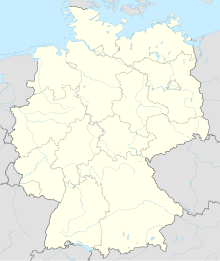Mariendom (Hamburg)
| Hamburg Cathedral | |
|---|---|
| Cathedral of St. Mary's Sankt Mariendom Dom St. Marien zu Hamburg |
|

St. Mary's Cathedral
|
|
| 53°32′57″N 09°59′52″E / 53.54917°N 9.99778°ECoordinates: 53°32′57″N 09°59′52″E / 53.54917°N 9.99778°E | |
| Location |
Hamburg Old Town |
| Country | Germany |
| Denomination | Lutheran |
| Previous denomination | Roman Catholic till 1531 |
| History | |
| Founded | 831 |
| Founder(s) | Ansgar |
| Dedication | Mary of Nazareth |
| Consecrated | 18 June 1329 |
| Architecture | |
| Status | Proto-cathedral |
| Functional status | Demolished |
| Architectural type | 5-naved hall church |
| Style | Brick Gothic |
| Groundbreaking | 1035 |
| Closed | 1531–1540 |
| Demolished | 1804–1807 |
| Specifications | |
| Materials | brick |
| Administration | |
| Archdiocese | Bremen |
| Province | Bremen |
Saint Mary's Cathedral in Hamburg (German: Sankt Mariendom, also Mariendom, or simply Dom or Domkirche, or Hamburger Dom) was the cathedral of the ancient Roman Catholic Archdiocese of Hamburg (not to be confused with Hamburg's modern Archdiocese, est. 1994), which was merged in personal union with the Diocese of Bremen in 847, and later in real union to form the Archdiocese of Hamburg-Bremen, as of 1027.
In 1180 the cathedral compound turned into the cathedral close (German: Domfreiheit; i.e. cathedral immunity district), forming an exclave of the Prince-Archbishopric of Bremen within the city of Hamburg. By the Reformation the concathedral was converted into a Lutheran church. The cathedral immunity district, since 1648 an exclave of the Duchy of Bremen, was seized by Hamburg in 1803. The city then prompted the demolition of the proto-cathedral between 1804 and 1807.
The cathedral, in common Italo-Nordic tradition simply called Dom (Italian: Duomo), which is the synecdoche, used – pars pro toto – for most existing or former collegiate churches and cathedrals in Germany alike. The cathedral was situated in the section of the earliest settlement of Hamburg on a geest hill between the rivers Alster and Elbe near Speersort street. Today's St. Peter's Church was erected right north of the Dom, today's Domstraße crosses through the former site of the cathedral. Curienstraße recalls the location of the canons' courts.
...
Wikipedia


